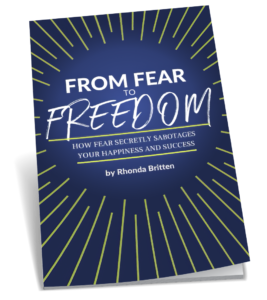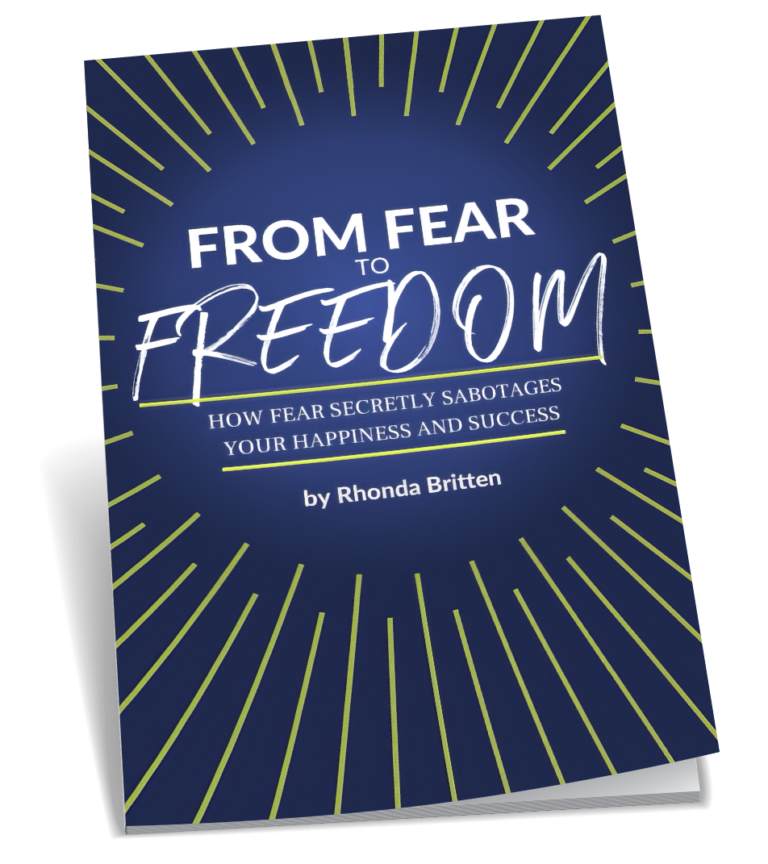“I don’t deserve forgiveness.”
“Forgiveness takes vulnerability, and that’s for the weak.”
“Forgiveness erases what happened.”
False. False. FALSE!
I’ve heard a lot of false information about forgiveness over the years, and these feelings often come from a place of fear. We’re afraid to look inward. We’re afraid to admit we could ever make a mistake. And we’re afraid of reliving our past pain.
Because self-forgiveness is so important to your fearless journey, I want to take the time to debunk some common myths about self-forgiveness. In this post, I’ll continue to dissect self-forgiveness, focusing on common myths that prevent people from truly being able to forgive themselves.
Why Is Self-Forgiveness So Hard?
We expect a lot from ourselves. We need to be selfless parents who only cook healthy food and are EXCITED to help our kids with their homework every night. We need to have successful careers that not only bring financial wealth but personal and spiritual wealth as well. We need to exercise and eat right. We need to get up early to meditate. And we need to do all of this while looking fabulous, too.

We work hard to cultivate a self-image and identity we can be proud to show off to the world. So when we make mistakes or treat someone unkindly, it shakes the foundation of that identity we’ve worked so hard to build.
We don’t want to recognize the mistake as a part of ourselves, so we ignore it or bury it deep and pretend it doesn’t exist.
Let’s say your identity is “amazing boss,” but one day, after a terrible sleep and too many cups of weak, tepid coffee, you snap at one of your employees for asking a simple question and yell at them in front of customers—so much so that their eyes get watery and they run to the back. An amazing boss would never yell at one of their team members and make them cry, right? Losing your temper in that way then throws into question your entire sense of self. It feels like a betrayal, which does serious damage to your self-esteem.
And guess what? Even after you apologize and your apology is accepted, you still feel terrible. How could they ever actually forgive you for being so rude? How can they ever think you’re an amazing boss again? You’ve ruined your own reputation.
So often, we get caught up in what other people think when forgiveness has so much to do with how you think and feel about yourself. It’s you who is unable to forgive yourself, not your team member. And this is because it’s HARD to forgive yourself. Forgiveness, in general, is really tough, and forgiving yourself is often even more difficult.
When you make a perceived mistake, it rocks the core of who you are and how you see yourself. It’s a betrayal that comes from the inside. And it’s often so painful that you sweep it under the rug or blame it on someone else—anything you can do to protect your self-image.
Trust me: I know self-forgiveness is hard. It took me 20 years to even begin forgiving myself, and it’s still a journey I walk every single day. Self-judgment and self-blame are difficult emotions, and while you may believe true self-forgiveness is impossible right now, I’m here to tell you that self-forgiveness isn’t only possible; it’s absolutely necessary to living the life your soul intended™.
So, let’s dig into (AND DEBUNK) some self-forgiveness myths that are keeping you from picking yourself up, dusting yourself off, and loving yourself for exactly who you are.
Self-Forgiveness Myths
Myth #1 — You Don’t Deserve Forgiveness
This is a big one—which is why it’s #1 on this list!
If this sounds like you, know you’re not alone.
So many people out there believe they are undeserving of forgiveness.
They believe they should be punished and locked away from the people and things they love because they no longer ‘deserve’ them. “I yelled at my team member yesterday. I know we talked about it and I apologized, but I should avoid the breakroom today. No one wants to see me. I’m a bad boss.”
And you can get pretty used to these bad feelings. After a while, torturing yourself for your past mistakes may even feel comfortable. Your pain and anger have become your comfort zone. You’ve internalized your anger at yourself so much that, consciously or unconsciously, it’s become key to your identity. Who are you? You’re a bad person. You’re not a good human. Other people are good, but you can never be like them because just look at your past actions. No one else has made the mistakes that you have.
Folks, be careful of falling into this habit of negative thoughts and negative self-talk!
Remember, the more you tell yourself the same story, the more you’re going to believe it.
If you continue to tell yourself that you’re ‘bad,’ your mental health will suffer. And if you’re constantly drowning yourself with negative emotions and negative feelings, your physical health is going to suffer too—you’re going to stop taking care of yourself because you don’t ‘deserve’ to be healthy.
Let’s get one thing clear: Forgiveness has nothing to do with ‘deserve’. Sometimes our most vital life lessons come from big mistakes—which aren’t even really mistakes if you think about it because each misstep is a profound opportunity to learn.
No one on this planet is perfect. We all do things we regret, things that embarrass us, our friends, family members, and coworkers, and even things that hurt others, unintentionally or not. While we may wish we could reverse the clock and do things differently, it would mean losing out on an important lesson.
If you are feeling guilt about something you’ve done, it’s a good sign that you shouldn’t do it again. Believing you don’t deserve forgiveness keeps you stuck in the past. It keeps you from growing.
I know this is tough, so think of it this way: Are you helping your friends and family by continuing to torture yourself? How could forgiving yourself and removing the dark cloud over your soul improve your own life and the lives of the people you love?
I’m not saying forgiveness is easy, but it’s definitely possible. When you’re done here, I encourage you to read my other guide: How to Forgive Even When It Feels Impossible.
Myth #2 — Forgiveness Is for the Weak
To forgive means to acknowledge your flaws. It means recognizing that you did something wrong, which shows you’re not perfect. You’re not as strong or infallible as you once thought. It means you must accept responsibility and accept your own vulnerability. Self-forgiveness requires self-love and self-compassion.
Often when I speak about the importance of self-compassion with my clients, they’ll say something like, “Compassion? Doesn’t that sound weak?” But everyone at Fearless Living learns to practice compassion because it’s the first step in making progress. It’s not weakness—it takes strength to show people compassion, and it takes even more strength to show it to yourself.
If you’re struggling to get over the word “compassion,” try “going easy on yourself” instead.
Yes, it’s true that self-forgiveness requires you to be vulnerable with yourself, but vulnerability is not synonymous with weakness. When we speak about vulnerability at Fearless Living, we speak about emotional vulnerability, which means freely acknowledging difficult emotions and experiences, first in front of yourself, and then in front of others. Exposing our inner thoughts and feelings in this way is definitely a challenge. So really, acknowledging (and one day celebrating) your own vulnerability takes tremendous courage and inner strength.
True vulnerability is the willingness to risk potential hurt or embarrassment to take our relationships to a deeper level, and the relationship you have with yourself is the most important relationship you have. Taking responsibility and being not only honest with yourself but also compassionate takes a lot of emotional intelligence, self-awareness, and courage. Does that sound like weakness to you?
Learn more about How To Be Vulnerable (Even When You’re Afraid).
Myth #3 — Forgiveness Is for Other People, Not You

Usually, when we think of forgiveness, we think of it as an act of kindness or compassion for others. Forgiving someone for a bad thing they did to you or a good thing they failed to do for you will help them feel better. When someone accepts your apology, it’s a weight off your shoulders; it’s like you can breathe again. At first, at least. Before long, I bet you’ll start feeling bad again once you’re alone and your thoughts start to race. You may begin to doubt they were sincere when they accepted your apology. But here’s what’s actually going on: You still haven’t forgiven yourself!
Forgiveness isn't just about forgiving others; it's also about learning how to forgive yourself. No matter what you did or didn’t do in the past, there is always a way to move forward and open up your heart, mind, and soul to a new, positive chapter in your life.
It may feel like an external thing that’s controlled by others, but hear me when I say this: Forgiveness has everything to do with you. Forgiveness is your personal journey. It’s about setting yourself free and letting go of the burden that’s weighing you down—what’s keeping you in a prison of pain, anger, and excuses.
No one else can do this for you. Whether the person you’ve wronged in some way forgives you or not, nothing is going to change until you truly and authentically forgive yourself.
Myth #4 — If You Forgive, It Means It Didn’t Happen
This is another major forgiveness myth, and it’s probably thanks to the phrase “forgive and forget.” Forgiving isn’t the same as forgetting, and I’m not suggesting you forget about the things you’ve done that you regret. After all, you can’t learn the lesson if you forget what happened!
You may not want to let go of something for fear you’ll repeat the same mistake, and I can understand that. This is actually a key part of self-forgiveness. Commit the lessons you learned to memory, not the bad act itself. Focus on what you learned, not the fact that it happened. You can’t change the past, but you can change your present and your future. You are accountable for making those changes.
I want you to accept responsibility and hold yourself accountable. I want you to learn. I do not want you to torture yourself because that doesn’t help. It’s not useful to you, and it’s not useful to your loved ones. Holding on to your pain and regret keeps you stuck in place. I want you to grow! You can’t grow if you forget your past, and you can’t grow if it’s the only thing you think about.
The only true path forward is self-forgiveness.
Myth #5 — Forgiveness Is a One-and-Done Event
Forgiving yourself isn’t like flicking on a light switch. It’s going to take time. Guilt and shame and bitter regret are very challenging things to get over, and sometimes, our mistakes feel so big that we can allow them to define us. If you’ve been living this way for a while, how you see yourself as a human being is going to need to change for the better. It’s going to take a long time to move on.
When my dad shot my mom dead and then turned the gun on himself, I blamed myself. I thought I had control over the situation. I thought if I’d said or done something different, maybe I could have calmed my father down or gotten my mom away from him. I carried this blame with me for a long time. I let it control my life. I became an alcoholic. I tried to lose myself in relationship after relationship. I attempted suicide three times. I wasn’t ready to even think about self-forgiveness for 20 years.
And trust me when I say it didn’t happen overnight. I didn’t wake up one day and think, “Gee, Rhonda, aren’t you about ready to forgive yourself? Yeah? Sounds good!”
Forgiveness is a journey of self-compassion and self-discovery; it’s a one step forward, two steps back kind of deal. Yeah, I’ve made great progress on my journey toward self-forgiveness, but I always have further to go. And just like me, you too will make huge leaps forward in your self-forgiveness process, but it doesn’t mean the journey is over.
Be patient with yourself. Show compassion to yourself. Be open to learning new things about yourself.
Practice self-forgiveness every day because while the path to self-forgiveness is long, you must walk it in order to realize your dreams and live the life your soul intended™.
How Do You Find Self-Forgiveness?

What is the key to self-forgiveness? Read my self-forgiveness guide next: How to Stop Feeling Guilty and Forgive Yourself.
Forgiveness is so, so, SO important, but that doesn’t mean it’s easy. Genuine self-forgiveness is really tough, so don’t walk the path alone. Peer support and community is essential during our most difficult times, which is why I encourage you to join Fearless You, where you can learn to master fear, build unshakable confidence, and finally forgive yourself.
We have two courses dedicated to forgiveness on Fearless You: Freedom of Forgiveness, and Forgive the Unforgivable. But that’s not all—a Fearless You membership also gives you access to every single one of my premium courses, all of which have been proven over 25 years, with tens of thousands of students. You’ll also get the chance to work with me and my coaches every month!
If you're ready to prioritize your own happiness and wellbeing, join us today! Whether through our online resources or in-person coaching programs, we can help you learn how to live life on your own terms.
Curious to learn more about how to forgive and how to be fearless? Contact me here with any questions, doubts, or issues you're currently experiencing. Let’s start your journey of forgiveness together.
“I don’t deserve forgiveness.”
“Forgiveness takes vulnerability, and that’s for the weak.”
“Forgiveness erases what happened.”
False. False. FALSE!
I’ve heard a lot of false information about forgiveness over the years, and these feelings often come from a place of fear. We’re afraid to look inward. We’re afraid to admit we could ever make a mistake. And we’re afraid of reliving our past pain.
Because self-forgiveness is so important to your fearless journey, I want to take the time to debunk some common myths about self-forgiveness. In this post, I’ll continue to dissect self-forgiveness, focusing on common myths that prevent people from truly being able to forgive themselves.
Why Is Self-Forgiveness So Hard?
We expect a lot from ourselves. We need to be selfless parents who only cook healthy food and are EXCITED to help our kids with their homework every night. We need to have successful careers that not only bring financial wealth but personal and spiritual wealth as well. We need to exercise and eat right. We need to get up early to meditate. And we need to do all of this while looking fabulous, too.

We work hard to cultivate a self-image and identity we can be proud to show off to the world. So when we make mistakes or treat someone unkindly, it shakes the foundation of that identity we’ve worked so hard to build.
We don’t want to recognize the mistake as a part of ourselves, so we ignore it or bury it deep and pretend it doesn’t exist.
Let’s say your identity is “amazing boss,” but one day, after a terrible sleep and too many cups of weak, tepid coffee, you snap at one of your employees for asking a simple question and yell at them in front of customers—so much so that their eyes get watery and they run to the back. An amazing boss would never yell at one of their team members and make them cry, right? Losing your temper in that way then throws into question your entire sense of self. It feels like a betrayal, which does serious damage to your self-esteem.
And guess what? Even after you apologize and your apology is accepted, you still feel terrible. How could they ever actually forgive you for being so rude? How can they ever think you’re an amazing boss again? You’ve ruined your own reputation.
So often, we get caught up in what other people think when forgiveness has so much to do with how you think and feel about yourself. It’s you who is unable to forgive yourself, not your team member. And this is because it’s HARD to forgive yourself. Forgiveness, in general, is really tough, and forgiving yourself is often even more difficult.
When you make a perceived mistake, it rocks the core of who you are and how you see yourself. It’s a betrayal that comes from the inside. And it’s often so painful that you sweep it under the rug or blame it on someone else—anything you can do to protect your self-image.
Trust me: I know self-forgiveness is hard. It took me 20 years to even begin forgiving myself, and it’s still a journey I walk every single day. Self-judgment and self-blame are difficult emotions, and while you may believe true self-forgiveness is impossible right now, I’m here to tell you that self-forgiveness isn’t only possible; it’s absolutely necessary to living the life your soul intended™.
So, let’s dig into (AND DEBUNK) some self-forgiveness myths that are keeping you from picking yourself up, dusting yourself off, and loving yourself for exactly who you are.
Self-Forgiveness Myths
Myth #1 — You Don’t Deserve Forgiveness
This is a big one—which is why it’s #1 on this list!
If this sounds like you, know you’re not alone.
So many people out there believe they are undeserving of forgiveness.
They believe they should be punished and locked away from the people and things they love because they no longer ‘deserve’ them. “I yelled at my team member yesterday. I know we talked about it and I apologized, but I should avoid the breakroom today. No one wants to see me. I’m a bad boss.”
And you can get pretty used to these bad feelings. After a while, torturing yourself for your past mistakes may even feel comfortable. Your pain and anger have become your comfort zone. You’ve internalized your anger at yourself so much that, consciously or unconsciously, it’s become key to your identity. Who are you? You’re a bad person. You’re not a good human. Other people are good, but you can never be like them because just look at your past actions. No one else has made the mistakes that you have.
Folks, be careful of falling into this habit of negative thoughts and negative self-talk!
Remember, the more you tell yourself the same story, the more you’re going to believe it.
If you continue to tell yourself that you’re ‘bad,’ your mental health will suffer. And if you’re constantly drowning yourself with negative emotions and negative feelings, your physical health is going to suffer too—you’re going to stop taking care of yourself because you don’t ‘deserve’ to be healthy.
Let’s get one thing clear: Forgiveness has nothing to do with ‘deserve’. Sometimes our most vital life lessons come from big mistakes—which aren’t even really mistakes if you think about it because each misstep is a profound opportunity to learn.
No one on this planet is perfect. We all do things we regret, things that embarrass us, our friends, family members, and coworkers, and even things that hurt others, unintentionally or not. While we may wish we could reverse the clock and do things differently, it would mean losing out on an important lesson.
If you are feeling guilt about something you’ve done, it’s a good sign that you shouldn’t do it again. Believing you don’t deserve forgiveness keeps you stuck in the past. It keeps you from growing.
I know this is tough, so think of it this way: Are you helping your friends and family by continuing to torture yourself? How could forgiving yourself and removing the dark cloud over your soul improve your own life and the lives of the people you love?
I’m not saying forgiveness is easy, but it’s definitely possible. When you’re done here, I encourage you to read my other guide: How to Forgive Even When It Feels Impossible.
Myth #2 — Forgiveness Is for the Weak
To forgive means to acknowledge your flaws. It means recognizing that you did something wrong, which shows you’re not perfect. You’re not as strong or infallible as you once thought. It means you must accept responsibility and accept your own vulnerability. Self-forgiveness requires self-love and self-compassion.
Often when I speak about the importance of self-compassion with my clients, they’ll say something like, “Compassion? Doesn’t that sound weak?” But everyone at Fearless Living learns to practice compassion because it’s the first step in making progress. It’s not weakness—it takes strength to show people compassion, and it takes even more strength to show it to yourself.
If you’re struggling to get over the word “compassion,” try “going easy on yourself” instead.
Yes, it’s true that self-forgiveness requires you to be vulnerable with yourself, but vulnerability is not synonymous with weakness. When we speak about vulnerability at Fearless Living, we speak about emotional vulnerability, which means freely acknowledging difficult emotions and experiences, first in front of yourself, and then in front of others. Exposing our inner thoughts and feelings in this way is definitely a challenge. So really, acknowledging (and one day celebrating) your own vulnerability takes tremendous courage and inner strength.
True vulnerability is the willingness to risk potential hurt or embarrassment to take our relationships to a deeper level, and the relationship you have with yourself is the most important relationship you have. Taking responsibility and being not only honest with yourself but also compassionate takes a lot of emotional intelligence, self-awareness, and courage. Does that sound like weakness to you?
Learn more about How To Be Vulnerable (Even When You’re Afraid).
Myth #3 — Forgiveness Is for Other People, Not You

Usually, when we think of forgiveness, we think of it as an act of kindness or compassion for others. Forgiving someone for a bad thing they did to you or a good thing they failed to do for you will help them feel better. When someone accepts your apology, it’s a weight off your shoulders; it’s like you can breathe again. At first, at least. Before long, I bet you’ll start feeling bad again once you’re alone and your thoughts start to race. You may begin to doubt they were sincere when they accepted your apology. But here’s what’s actually going on: You still haven’t forgiven yourself!
Forgiveness isn't just about forgiving others; it's also about learning how to forgive yourself. No matter what you did or didn’t do in the past, there is always a way to move forward and open up your heart, mind, and soul to a new, positive chapter in your life.
It may feel like an external thing that’s controlled by others, but hear me when I say this: Forgiveness has everything to do with you. Forgiveness is your personal journey. It’s about setting yourself free and letting go of the burden that’s weighing you down—what’s keeping you in a prison of pain, anger, and excuses.
No one else can do this for you. Whether the person you’ve wronged in some way forgives you or not, nothing is going to change until you truly and authentically forgive yourself.
Myth #4 — If You Forgive, It Means It Didn’t Happen
This is another major forgiveness myth, and it’s probably thanks to the phrase “forgive and forget.” Forgiving isn’t the same as forgetting, and I’m not suggesting you forget about the things you’ve done that you regret. After all, you can’t learn the lesson if you forget what happened!
You may not want to let go of something for fear you’ll repeat the same mistake, and I can understand that. This is actually a key part of self-forgiveness. Commit the lessons you learned to memory, not the bad act itself. Focus on what you learned, not the fact that it happened. You can’t change the past, but you can change your present and your future. You are accountable for making those changes.
I want you to accept responsibility and hold yourself accountable. I want you to learn. I do not want you to torture yourself because that doesn’t help. It’s not useful to you, and it’s not useful to your loved ones. Holding on to your pain and regret keeps you stuck in place. I want you to grow! You can’t grow if you forget your past, and you can’t grow if it’s the only thing you think about.
The only true path forward is self-forgiveness.
Myth #5 — Forgiveness Is a One-and-Done Event
Forgiving yourself isn’t like flicking on a light switch. It’s going to take time. Guilt and shame and bitter regret are very challenging things to get over, and sometimes, our mistakes feel so big that we can allow them to define us. If you’ve been living this way for a while, how you see yourself as a human being is going to need to change for the better. It’s going to take a long time to move on.
When my dad shot my mom dead and then turned the gun on himself, I blamed myself. I thought I had control over the situation. I thought if I’d said or done something different, maybe I could have calmed my father down or gotten my mom away from him. I carried this blame with me for a long time. I let it control my life. I became an alcoholic. I tried to lose myself in relationship after relationship. I attempted suicide three times. I wasn’t ready to even think about self-forgiveness for 20 years.
And trust me when I say it didn’t happen overnight. I didn’t wake up one day and think, “Gee, Rhonda, aren’t you about ready to forgive yourself? Yeah? Sounds good!”
Forgiveness is a journey of self-compassion and self-discovery; it’s a one step forward, two steps back kind of deal. Yeah, I’ve made great progress on my journey toward self-forgiveness, but I always have further to go. And just like me, you too will make huge leaps forward in your self-forgiveness process, but it doesn’t mean the journey is over.
Be patient with yourself. Show compassion to yourself. Be open to learning new things about yourself.
Practice self-forgiveness every day because while the path to self-forgiveness is long, you must walk it in order to realize your dreams and live the life your soul intended™.
How Do You Find Self-Forgiveness?

What is the key to self-forgiveness? Read my self-forgiveness guide next: How to Stop Feeling Guilty and Forgive Yourself.
Forgiveness is so, so, SO important, but that doesn’t mean it’s easy. Genuine self-forgiveness is really tough, so don’t walk the path alone. Peer support and community is essential during our most difficult times, which is why I encourage you to join Fearless You, where you can learn to master fear, build unshakable confidence, and finally forgive yourself.
We have two courses dedicated to forgiveness on Fearless You: Freedom of Forgiveness, and Forgive the Unforgivable. But that’s not all—a Fearless You membership also gives you access to every single one of my premium courses, all of which have been proven over 25 years, with tens of thousands of students. You’ll also get the chance to work with me and my coaches every month!
If you're ready to prioritize your own happiness and wellbeing, join us today! Whether through our online resources or in-person coaching programs, we can help you learn how to live life on your own terms.
Curious to learn more about how to forgive and how to be fearless? Contact me here with any questions, doubts, or issues you're currently experiencing. Let’s start your journey of forgiveness together.







